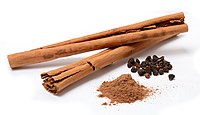
Photo from wikipedia
To investigate the mechanisms of phosphates affecting the solubility and emulsifying properties of perilla protein isolate (PPI), PPI was treated with sodium trimetaphosphate (STMP) and sodium tripolyphosphate (STPP) at different… Click to show full abstract
To investigate the mechanisms of phosphates affecting the solubility and emulsifying properties of perilla protein isolate (PPI), PPI was treated with sodium trimetaphosphate (STMP) and sodium tripolyphosphate (STPP) at different concentrations. FTIR and XPS showed that phosphate groups were bonded to PPI through COP bonds. The introduction of STPP increased the particle size and electronegativity of PPI, resulting in the exposure of hydrophobic groups and free -SH groups, as well as the changes of secondary structure and tertiary conformation. All these variations induced increased oil holding capacity, thermal stability, solubility, emulsifying and foaming properties of PPI, especially at STPP concentration of 8%. Furthermore, o/w emulsions stabilized by STPP-modified PPI exhibited higher stability, which could be attributed to the higher interfacial adsorption protein amount and smaller droplet size. These results indicated that PPI modified by phosphate (especially STPP) can be used in the construction of food-grade emulsion systems.
Journal Title: Food chemistry
Year Published: 2022
Link to full text (if available)
Share on Social Media: Sign Up to like & get
recommendations!